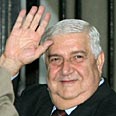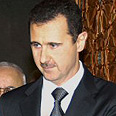

Moallem portrayed Syria as a potential partner in stabilizing the region. He referred at one point to "the noble cause of peace between Syria and Israel."
When asked by the Daily Star if Syrian President Bashar Assad endorsed these positions, he answered: "He is the leader. I am expressing his ideas."
He emphasized Syria's willingness to enter negotiations without preconditions, stating that "a constructive dialogue has to start without preconditions."
According to the Daily Star, Moallem said that said Syria wasn't shipping arms to Hizbullah, would "continue our cooperation" with the United Nations investigation of the murder for former Lebanese Prime Minister Rafik Hariri, and was "ready" to "achieve a deal on exchanging prisoners" with Israel.
He also disclosed what he said was a previously unreported effort by Syria and Qatar to broker a compromise between the radical Palestinian group Hamas and the moderate Fatah faction of President Mahmoud Abbas.
Syrian intentions in Iraq
According to Moallem's statements to the paper, Syria is interested in aiding the United States, by playing a positive role in stabilizing Iraq.
"We are not against the US," Moallem said. "To the contrary, we want to be part of a regional dialogue that, in our opinion, serves American interests in the region." He described America and the region as being at a "crossroads" and explained: "Either we go for stability, or the region will fall, and religious civil wars and the extremists behind them will take over."
Later, he clarified that while Syria favors a timetable for US withdrawal from Iraq, a rapid American withdrawal before Iraqis are ready to take over security would be "an immoral step."
He denied that Syria was seeking greater power in Lebanon as the price for its help in Iraq. "This is not a deal. This is not, 'we will do this if you give us Lebanon,"' he said. But he did note that if America wanted dialogue, "you need to reassure us about your good intentions concerning our stability."
The Bush administration, on its part, has shown little interest so far in dialogue with Damascus, and the administration has been sharply critical of Syria's campaign against pro-US Lebanese Prime Minister Fouad Siniora.
Administration officials have said in the past that although Syria speaks of a desire for cooperation and dialogue, its actions - in Lebanon and elsewhere - have not matched its words.
Syria has already begun implementing some of the Baker-Hamilton recommendations for Iraq, Moallem said. With this month's restoration of Syrian-Iraqi diplomatic ties, he explained, the two countries are beginning joint efforts to control their border and increase political and economic cooperation, as called for by the report.
"We are not doing this to please the US. We are doing what is in the Syrian and Iraqi interest," he said.
A former Syrian ambassador to Washington, Moallem worked with Baker on diplomatic issues involving the 1991 Madrid peace conference, which opened the way for peace talks between Syria and Israel that were ultimately unsuccessful.
The Syrian told the Daily Star that when they met again last September to discuss the Iraq Study Group, Baker asked him: "'Walid, how can we return to the Syrian-American situation of the early 1990s, when we succeeded to build mutual trust?' I told him: 'This is our wish also in Syria."'















